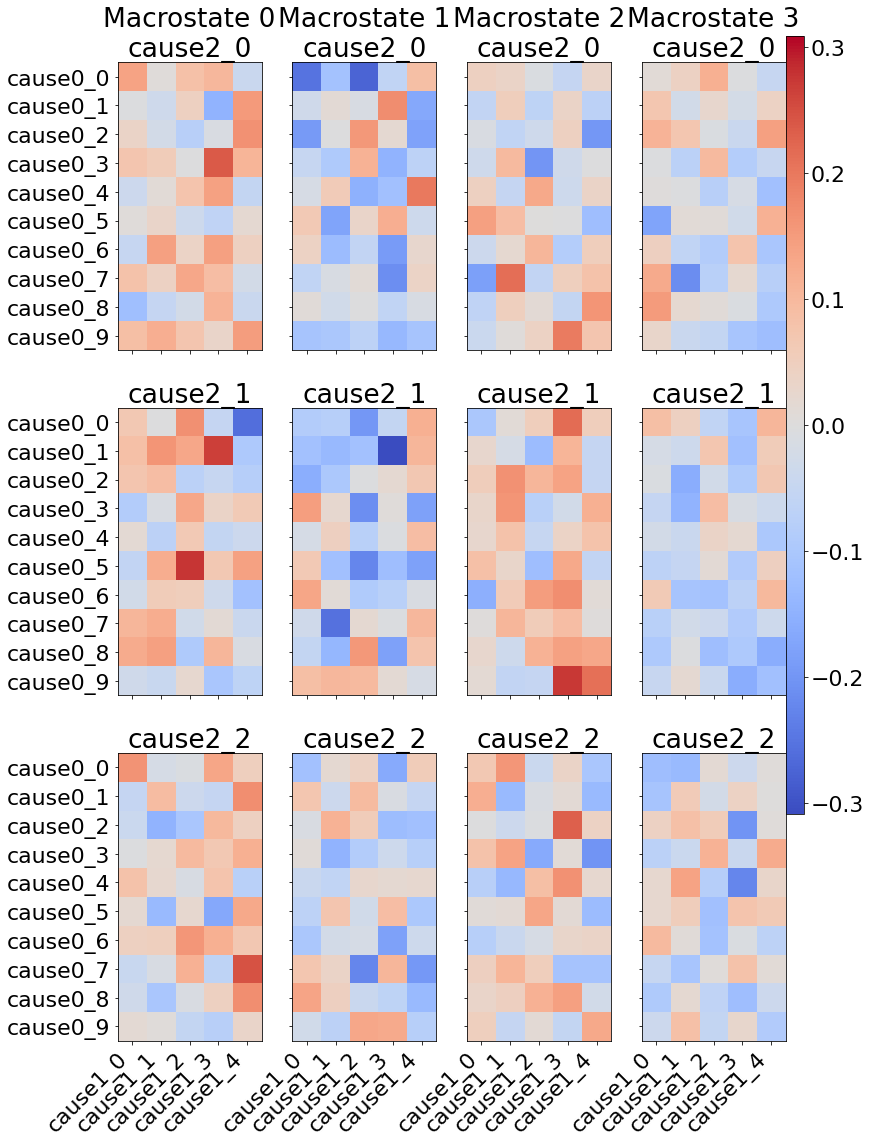Built-in Macrostate Visualizations
This notebook demonstrates how to use the visualize_macrostates function to visualize the macrostates that CFL constructs over cause and effect spaces.
[1]:
import numpy as np
from cfl.experiment import Experiment
from cfl.visualization.basic_visualizations import visualize_macrostates
CFL helper function
First, we will create a helper function to quickly define and train CFL experiments. If you are unfamiliar with how to define a CFL experiment, please refer to the cfl_code_intro notebook.
[2]:
def create_and_train_CFL_experiment(X, Y):
''' Helper function that will create a CFL experiment and train it for
this demo.
'''
# set up pipeline parameters
data_info = {'X_dims' : X.shape, 'Y_dims' : Y.shape, 'Y_type' : 'continuous'}
CDE_params = {'model' : 'CondExpMod', 'model_params' :
{'n_epochs' : 5, 'verbose' : 0, 'show_plot' : False}}
cause_cluster_params = {'model' : 'KMeans', 'model_params' : {'n_clusters' : 4},
'verbose' : 0, 'tune' : False}
effect_cluster_params = {'model' : 'KMeans', 'model_params' : {'n_clusters' : 2},
'verbose' : 0, 'tune' : False}
block_names = ['CondDensityEstimator', 'CauseClusterer', 'EffectClusterer']
block_params = [CDE_params, cause_cluster_params, effect_cluster_params]
save_path = 'basic_vis_results'
# Create a new CFL experiment with specified parameters
my_exp = Experiment(X_train=X, Y_train=Y, data_info=data_info,
block_names=block_names, block_params=block_params,
results_path=save_path, verbose=0)
my_exp.train()
return my_exp
Visualizing macrostates over 1D data
Here, we construct a dataset where the variables in both X and Y are 1-dimensional. Here, when we say 1-dimensional, we mean that the data is not spatially organized in 2D (like an image), or any other higher dimensional organization. Note that the data can still contain many variables, and in that sense it is high-dimensional, but in the context of visualization it is 1D.
[3]:
# define the parameters of our toy dataset
n_samples = 1000
n_cause_features = 10
n_effect_features = 2
# randomly sampled X and Y values
X = np.random.normal(loc=1, size=(n_samples,n_cause_features))
Y = np.random.normal(loc=2, size=(n_samples,n_effect_features))
print('X shape: ', X.shape)
print('Y shape: ', Y.shape)
# name each feature in X and Y (you may have more specific variable names that
# you'd want to supply here)
X_feature_names = [f'cause_{i}' for i in range(n_cause_features)]
Y_feature_names = [f'effect_{i}' for i in range(n_effect_features)]
# create and train experiment
my_exp = create_and_train_CFL_experiment(X, Y)
# print out where the experiment was saved
print('Experiment saved to: ')
print(my_exp.get_save_path())
X shape: (1000, 10)
Y shape: (1000, 2)
Block: verbose not specified in input, defaulting to 1
WARNING:tensorflow:AutoGraph could not transform <function Model.make_train_function.<locals>.train_function at 0x1a4929b0e0> and will run it as-is.
Please report this to the TensorFlow team. When filing the bug, set the verbosity to 10 (on Linux, `export AUTOGRAPH_VERBOSITY=10`) and attach the full output.
Cause: 'arguments' object has no attribute 'posonlyargs'
To silence this warning, decorate the function with @tf.autograph.experimental.do_not_convert
WARNING: AutoGraph could not transform <function Model.make_train_function.<locals>.train_function at 0x1a4929b0e0> and will run it as-is.
Please report this to the TensorFlow team. When filing the bug, set the verbosity to 10 (on Linux, `export AUTOGRAPH_VERBOSITY=10`) and attach the full output.
Cause: 'arguments' object has no attribute 'posonlyargs'
To silence this warning, decorate the function with @tf.autograph.experimental.do_not_convert
WARNING:tensorflow:AutoGraph could not transform <function Model.make_test_function.<locals>.test_function at 0x1a494e2c20> and will run it as-is.
Please report this to the TensorFlow team. When filing the bug, set the verbosity to 10 (on Linux, `export AUTOGRAPH_VERBOSITY=10`) and attach the full output.
Cause: 'arguments' object has no attribute 'posonlyargs'
To silence this warning, decorate the function with @tf.autograph.experimental.do_not_convert
WARNING: AutoGraph could not transform <function Model.make_test_function.<locals>.test_function at 0x1a494e2c20> and will run it as-is.
Please report this to the TensorFlow team. When filing the bug, set the verbosity to 10 (on Linux, `export AUTOGRAPH_VERBOSITY=10`) and attach the full output.
Cause: 'arguments' object has no attribute 'posonlyargs'
To silence this warning, decorate the function with @tf.autograph.experimental.do_not_convert
WARNING:tensorflow:AutoGraph could not transform <function Model.make_predict_function.<locals>.predict_function at 0x1a4a3a1ef0> and will run it as-is.
Please report this to the TensorFlow team. When filing the bug, set the verbosity to 10 (on Linux, `export AUTOGRAPH_VERBOSITY=10`) and attach the full output.
Cause: 'arguments' object has no attribute 'posonlyargs'
To silence this warning, decorate the function with @tf.autograph.experimental.do_not_convert
WARNING: AutoGraph could not transform <function Model.make_predict_function.<locals>.predict_function at 0x1a4a3a1ef0> and will run it as-is.
Please report this to the TensorFlow team. When filing the bug, set the verbosity to 10 (on Linux, `export AUTOGRAPH_VERBOSITY=10`) and attach the full output.
Cause: 'arguments' object has no attribute 'posonlyargs'
To silence this warning, decorate the function with @tf.autograph.experimental.do_not_convert
100%|██████████| 1000/1000 [00:00<00:00, 6930.31it/s]
Experiment saved to:
basic_vis_results/experiment0000
The simplest way to visualize macrostates is by taking all of the samples in our dataset that fall into a certain macrostate and looking at the mean across those samples. We can then compare these means across macrostates to see how variables differ.
Here’s how you would visualize the means of the macrostates CFL found on the cause side:
[4]:
# visualize cause side macrostates
visualize_macrostates( data=X, # data to visualize
feature_names=X_feature_names,
cause_or_effect='cause',
exp_path='basic_vis_results/experiment0000', # where was the data saved?
data_series='dataset_train', # if you've passed multiple datasets through CFL's predict method, you can select which one you want
subtract_global_mean=True) # do you want to plot the raw data or relative to the global mean?
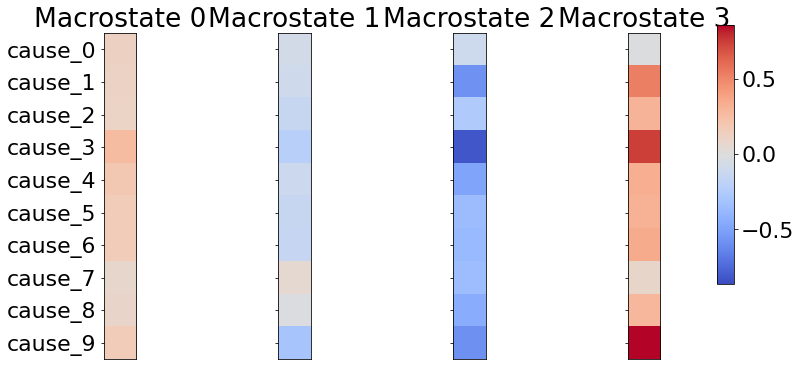
The process is quite similar for visualizing results on the effect side, except that now you change the data, feature_names, and cause_or_effect values:
[5]:
# visualize effect side macrostates
visualize_macrostates( data=Y,
feature_names=Y_feature_names,
cause_or_effect='effect', # change the space you want to plot in along with the data
exp_path='basic_vis_results/experiment0000',
data_series='dataset_train',
subtract_global_mean=True)
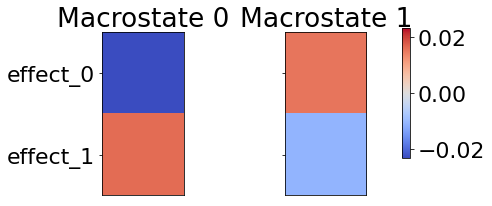
Up to now, we told visualize_macrostates to subtract the global mean from each of macrostate means. You can also plot the raw means by setting subtract_global_mean to False:
[6]:
# visualize effect side macrostates
visualize_macrostates( data=Y,
feature_names=Y_feature_names,
cause_or_effect='effect', # change the space you want to plot in along with the data
exp_path='basic_vis_results/experiment0000',
data_series='dataset_train',
subtract_global_mean=False)
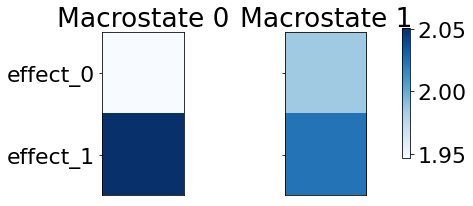
2D visualization
[7]:
# define the parameters of our toy dataset
n_samples = 1000
n_cause_features = [10,5] # our cause samples are now 10x5 images
n_effect_features = 2
# randomly sampled X and Y values
# note that we construct X_flattened here to pass in vectorized samples to CFL
X = np.random.normal(loc=1, size=np.concatenate([[n_samples], n_cause_features]))
X_flattened = np.reshape(X, (n_samples, np.product(n_cause_features)))
Y = np.random.normal(loc=2, size=(n_samples,n_effect_features))
print('X shape: ', X.shape)
print('X flattened (for CFL) shape: ', X_flattened.shape)
print('Y shape: ', Y.shape)
# name each feature in X and Y (you may have more specific variable names that
# you'd want to supply here)
X_feature_names = [[f'cause{j}_{i}' for i in range(n_cause_features[j])] for j in range(len(n_cause_features))]
Y_feature_names = [f'effect_{i}' for i in range(n_effect_features)]
# create and train experiment
my_exp = create_and_train_CFL_experiment(X_flattened, Y)
# print out where the experiment was saved
print('Experiment saved to: ')
print(my_exp.get_save_path())
X shape: (1000, 10, 5)
X flattened (for CFL) shape: (1000, 50)
Y shape: (1000, 2)
Block: verbose not specified in input, defaulting to 1
WARNING:tensorflow:AutoGraph could not transform <function Model.make_train_function.<locals>.train_function at 0x1a49c38dd0> and will run it as-is.
Please report this to the TensorFlow team. When filing the bug, set the verbosity to 10 (on Linux, `export AUTOGRAPH_VERBOSITY=10`) and attach the full output.
Cause: 'arguments' object has no attribute 'posonlyargs'
To silence this warning, decorate the function with @tf.autograph.experimental.do_not_convert
WARNING: AutoGraph could not transform <function Model.make_train_function.<locals>.train_function at 0x1a49c38dd0> and will run it as-is.
Please report this to the TensorFlow team. When filing the bug, set the verbosity to 10 (on Linux, `export AUTOGRAPH_VERBOSITY=10`) and attach the full output.
Cause: 'arguments' object has no attribute 'posonlyargs'
To silence this warning, decorate the function with @tf.autograph.experimental.do_not_convert
WARNING:tensorflow:AutoGraph could not transform <function Model.make_test_function.<locals>.test_function at 0x1a49ccfc20> and will run it as-is.
Please report this to the TensorFlow team. When filing the bug, set the verbosity to 10 (on Linux, `export AUTOGRAPH_VERBOSITY=10`) and attach the full output.
Cause: 'arguments' object has no attribute 'posonlyargs'
To silence this warning, decorate the function with @tf.autograph.experimental.do_not_convert
WARNING: AutoGraph could not transform <function Model.make_test_function.<locals>.test_function at 0x1a49ccfc20> and will run it as-is.
Please report this to the TensorFlow team. When filing the bug, set the verbosity to 10 (on Linux, `export AUTOGRAPH_VERBOSITY=10`) and attach the full output.
Cause: 'arguments' object has no attribute 'posonlyargs'
To silence this warning, decorate the function with @tf.autograph.experimental.do_not_convert
WARNING:tensorflow:AutoGraph could not transform <function Model.make_predict_function.<locals>.predict_function at 0x1a49e729e0> and will run it as-is.
Please report this to the TensorFlow team. When filing the bug, set the verbosity to 10 (on Linux, `export AUTOGRAPH_VERBOSITY=10`) and attach the full output.
Cause: 'arguments' object has no attribute 'posonlyargs'
To silence this warning, decorate the function with @tf.autograph.experimental.do_not_convert
WARNING: AutoGraph could not transform <function Model.make_predict_function.<locals>.predict_function at 0x1a49e729e0> and will run it as-is.
Please report this to the TensorFlow team. When filing the bug, set the verbosity to 10 (on Linux, `export AUTOGRAPH_VERBOSITY=10`) and attach the full output.
Cause: 'arguments' object has no attribute 'posonlyargs'
To silence this warning, decorate the function with @tf.autograph.experimental.do_not_convert
100%|██████████| 1000/1000 [00:00<00:00, 6702.05it/s]
Experiment saved to:
basic_vis_results/experiment0001
[8]:
# visualize cause side macrostates
visualize_macrostates( data=X,
feature_names=X_feature_names,
cause_or_effect='cause',
exp_path='basic_vis_results/experiment0001',
data_series='dataset_train',
subtract_global_mean=True)
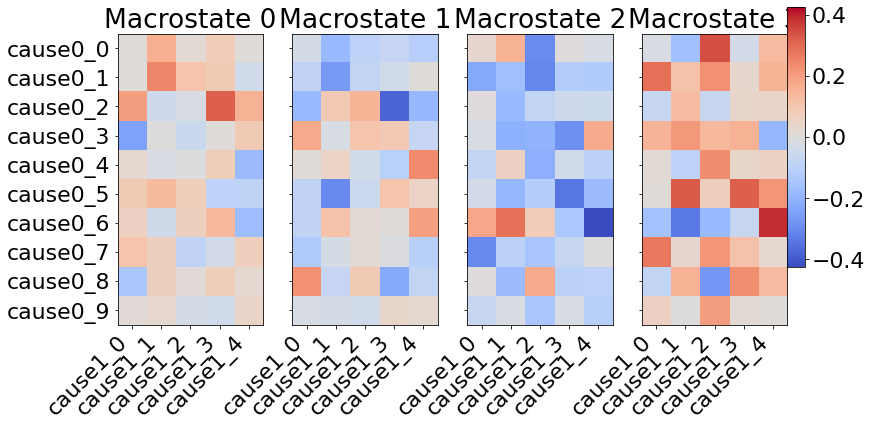
3D visualization
[9]:
# define the parameters of our toy dataset
n_samples = 1000
n_cause_features = [10,5,3] # our cause samples are now 10x5x3 volumes
n_effect_features = 2
# randomly sampled X and Y values
# note that we construct X_flattened here to pass in vectorized samples to CFL
X = np.random.normal(loc=1, size=np.concatenate([[n_samples], n_cause_features]))
X_flattened = np.reshape(X, (n_samples, np.product(n_cause_features)))
Y = np.random.normal(loc=2, size=(n_samples,n_effect_features))
print('X shape: ', X.shape)
print('X flattened (for CFL) shape: ', X_flattened.shape)
print('Y shape: ', Y.shape)
# name each feature in X and Y (you may have more specific variable names that
# you'd want to supply here)
X_feature_names = [[f'cause{j}_{i}' for i in range(n_cause_features[j])] for j in range(len(n_cause_features))]
Y_feature_names = [f'effect_{i}' for i in range(n_effect_features)]
# create and train experiment
my_exp = create_and_train_CFL_experiment(X_flattened, Y)
# print out where the experiment was saved
print('Experiment saved to: ')
print(my_exp.get_save_path())
X shape: (1000, 10, 5, 3)
X flattened (for CFL) shape: (1000, 150)
Y shape: (1000, 2)
Block: verbose not specified in input, defaulting to 1
WARNING:tensorflow:AutoGraph could not transform <function Model.make_train_function.<locals>.train_function at 0x1a4adbf560> and will run it as-is.
Please report this to the TensorFlow team. When filing the bug, set the verbosity to 10 (on Linux, `export AUTOGRAPH_VERBOSITY=10`) and attach the full output.
Cause: 'arguments' object has no attribute 'posonlyargs'
To silence this warning, decorate the function with @tf.autograph.experimental.do_not_convert
WARNING: AutoGraph could not transform <function Model.make_train_function.<locals>.train_function at 0x1a4adbf560> and will run it as-is.
Please report this to the TensorFlow team. When filing the bug, set the verbosity to 10 (on Linux, `export AUTOGRAPH_VERBOSITY=10`) and attach the full output.
Cause: 'arguments' object has no attribute 'posonlyargs'
To silence this warning, decorate the function with @tf.autograph.experimental.do_not_convert
WARNING:tensorflow:AutoGraph could not transform <function Model.make_test_function.<locals>.test_function at 0xf160dd560> and will run it as-is.
Please report this to the TensorFlow team. When filing the bug, set the verbosity to 10 (on Linux, `export AUTOGRAPH_VERBOSITY=10`) and attach the full output.
Cause: 'arguments' object has no attribute 'posonlyargs'
To silence this warning, decorate the function with @tf.autograph.experimental.do_not_convert
WARNING: AutoGraph could not transform <function Model.make_test_function.<locals>.test_function at 0xf160dd560> and will run it as-is.
Please report this to the TensorFlow team. When filing the bug, set the verbosity to 10 (on Linux, `export AUTOGRAPH_VERBOSITY=10`) and attach the full output.
Cause: 'arguments' object has no attribute 'posonlyargs'
To silence this warning, decorate the function with @tf.autograph.experimental.do_not_convert
WARNING:tensorflow:AutoGraph could not transform <function Model.make_predict_function.<locals>.predict_function at 0x1a49fd34d0> and will run it as-is.
Please report this to the TensorFlow team. When filing the bug, set the verbosity to 10 (on Linux, `export AUTOGRAPH_VERBOSITY=10`) and attach the full output.
Cause: 'arguments' object has no attribute 'posonlyargs'
To silence this warning, decorate the function with @tf.autograph.experimental.do_not_convert
WARNING: AutoGraph could not transform <function Model.make_predict_function.<locals>.predict_function at 0x1a49fd34d0> and will run it as-is.
Please report this to the TensorFlow team. When filing the bug, set the verbosity to 10 (on Linux, `export AUTOGRAPH_VERBOSITY=10`) and attach the full output.
Cause: 'arguments' object has no attribute 'posonlyargs'
To silence this warning, decorate the function with @tf.autograph.experimental.do_not_convert
100%|██████████| 1000/1000 [00:00<00:00, 1872.22it/s]
Experiment saved to:
basic_vis_results/experiment0002
[10]:
# visualize cause side macrostates
visualize_macrostates( data=X,
feature_names=X_feature_names,
cause_or_effect='cause',
exp_path='basic_vis_results/experiment0002',
data_series='dataset_train',
subtract_global_mean=True)
